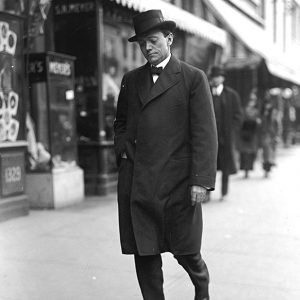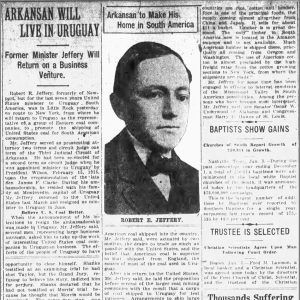calsfoundation@cals.org
Robert Emmett Jeffery Jr. (1875–1935)
Robert E. Jeffery Jr. was a descendent of one of the earliest families to settle in north–central Arkansas. With very little formal education, he practiced law and also served as a prosecuting attorney, circuit judge, and member of the Arkansas General Assembly. In 1915, he was appointed a minister to Uruguay by President Woodrow Wilson.
Robert Emmett Jeffery Jr. was born in Mount Olive (Izard County) on January 30, 1875, to Dr. Robert Emmett Jeffery Sr. and Mary Cason Jeffery. He was the great-grandson of Jehoida Jeffery, considered by some to be the first white settler in present–day Izard County. He was the oldest of eight brothers and two sisters.
Jeffery, who was called Boyse by his family, grew up in rural Arkansas and had few opportunities for a formal education, attending local schools for no more than three months at a time. However, his lack of formal education did not hinder his advancement. After reading law, he was admitted to the bar in Mountain View (Stone County) in 1900 at the age of twenty-five and, that same year, was elected to the Arkansas House of Representatives. As a member of the House, he was an active supporter of Branch Normal College (present–day University of Arkansas at Pine Bluff). Retiring from the House after a single term, he established a law practice in Newport (Jackson County). In 1906, he was elected as the prosecuting attorney for the Third Circuit, serving until he was elected judge of the Third Circuit in 1910.
In 1915, Jeffery’s boyhood friend Congressman William Oldfield quietly began to lobby the Wilson administration for a position for Jeffery. While his reasons are unknown, it was likely due to their lifelong friendship. However, others suggested that Oldfield was concerned about the challenge the popular Jeffery might present to his own political security. With the assistance of Oldfield and Arkansas senators James P. Clarke and Joseph T. Robinson, Jeffery was recommended to President Wilson and Secretary of State William J. Bryan. On February 3, 1915, he was appointed as minister to Uruguay with the official title of Envoy Extraordinary and Minister Plenipotentiary.
A little over a month after assuming his official duties, Jeffery married twenty-one–year–old Lynn Nita Hooss in St. Louis, Missouri, on March 17, 1915. They had two sons, Robert and Jerry. The couple traveled to South America by steamer shortly after their wedding.
Jeffery began his foreign service when he officially presented his credentials to the government of Uruguay in Montevideo on June 4, 1915. Much of his foreign service consisted of settling minor disputes by local constituents. However, his defining accomplishments during his six years of foreign service came during World War I. Jeffery was able to convince Uruguay’s government to support the United States’ war policy and worked to prevent the German navy from using Montevideo, one of the largest ports in South America. Finally, through his efforts, Uruguay broke off diplomatic relations with Germany in December 1917.
With the victory of Republican Warren Harding in 1920, Jeffery’s mission was terminated on March 9, 1921. Jeffery and his wife retired to Newport, where he led a quiet life. With a strong belief in education, he was known to frequently visit backwoods Arkansas schools delivering motivational speeches about the worth of an education—the kind that he was never able to receive.
In 1925, at age fifty he suffered a stroke. He died in Newport on May 19, 1935. He is buried in Oaklawn Cemetery in Batesville (Independence County).
For additional information:
Hanks, Dale. “Mount Olive to Montevideo: Politics and Strange Bedfellows.” Arkansas Family Historian 46 (March 2008): 5–29.
Hinshaw, J. E. Call the Roll: The First Hundred Years of the Arkansas Legislature. Little Rock: Rose Publishing Co., 1985.
“Judge Jeffery to Become a Diplomat.” Arkansas Gazette, January 26, 1915, p. 2.
Mike Polston
CALS Encyclopedia of Arkansas








Comments
No comments on this entry yet.